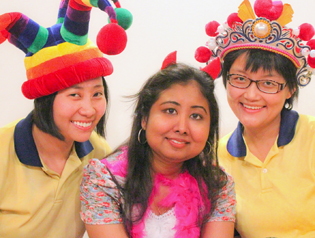Young Children’s Voices in Mathematical Problem Solving
Contributed by Dr Ho Siew Yin and Sng Wei Qin Abbie, from NTUC First Campus, for SingTeach Virtual […]
Read More
The pupils of Bukit View Primary School now have something to look forward to each time they set foot in their Mother Tongue classrooms – acting. The primary school has brought language learning to a whole new level by infusing drama in their lessons. They share how drama is used as a key pedagogy to teach their pupils both language skills and values.
You are alone in a convenience store. Is it right to steal? “No, it’s wrong!” your conscience might tell you. “But nobody is watching!” comes the rejoinder. Now imagine these opposing reasons being thrown at you as you walk down an aisle lined by “angels” and “devils”, acted out by classmates who are trying to sway your final decision. Will you steal?
This technique – Conscience Alley – is one of the many drama strategies used by teachers at Bukit View Primary School (BVPS). Scenarios like this come alive when they are dramatized.
As part of the school curriculum, the teachers use drama as a key pedagogy to teach and inculcate values in their pupils. This allows them to not only consider moral issues but also express themselves confidently and develop their language skills.
Aptly named ACTION! Drama in Curriculum, the purpose of using drama is to strengthen the teaching of English and Mother Tongue languages.
 “Drama is used as a key pedagogy to enhance the teaching of English Language and to develop the four different skills – reading, speaking, writing and listening,” says School Staff Developer Mrs Selena Ang.
“Drama is used as a key pedagogy to enhance the teaching of English Language and to develop the four different skills – reading, speaking, writing and listening,” says School Staff Developer Mrs Selena Ang.
What began as an ad-hoc practice – used as and when it matched the learning objectives – soon became part and parcel of the language curriculum.
The school saw the potential of using drama to instil 21st century competencies, namely the 3Cs – Curiosity, Confidence and Co-operation – in their pupils as well.
Drama was first used to teach the English Language in 2010. Thereafter, it was integrated into Mother Tongue classes in 2011.
The teachers note that it was very natural for the school to embark on this innovative programme; it did not feel like an add-on activity. It also fits in nicely with the Ministry of Education’s emphasis on Character and Citizenship Education.
Since the end of last year, the Mother Tongue teachers have been seeking to align language learning with Civics and Moral Education (CME).
“We have the CME values as the focus, and then we use drama strategies in the lesson plans,” explains Tamil Language teacher Ms Mumtaz Bte Maideen, who is also Subject Head for National Education and Community Involvement Programme.
– Mrs Teo-Zhang Juan Juan on the effectiveness of using drama to teach values as well as subject content
Given the expectation to teach content and inculcate values in pupils, the integration of drama into Mother Tongue and CME at the same time may seem a bit of a stretch. However, this is not the case for these primary school teachers.
Head of Department for Mother Tongue Mrs Teo-Zhang Juan Juan explains, “Using drama and integrating it into CME and Mother Tongue is more effective. It’s like three things combined into one. It really works well because values are more internalized.”
The use of drama has certainly made classroom learning more engaging. The pupils now have a newfound interest and display a renewed enthusiasm towards learning their Mother Tongue.
It also puts greater emphasis on the role of teachers as facilitators. Pupils turn into actors and actresses while the teachers play a supporting role during language lessons. Says Juan Juan, “Drama is meant to be student-centred. The pupils are the ones playing the major roles in the classrooms.”
Infusing drama into lessons gives pupils authentic learning experiences and ignites their imagination through role play. With drama, pupils have the opportunity to explore many different situations that put their moral values to the test.

Besides Conscience Alley, other interesting strategies such as Role on the Wall, Freeze Frame and Readers’ Theatre also enhance pupils’ critical thinking and decision-making skills.
Ms Fong Mei Ying, Subject Head for Mother Tongue and CME, observes that some of her pupils have become more confident and creative. She shares that her Primary 2 pupils actively participate in her lessons when she allows their imaginations to roam.
Citing an example of their lively imaginations, she says, “They will use the table as a tree and duster as a cherry. These are the things they tell me, and I do not tell them.”
Juan Juan also notes that the school’s values have been developed in their pupils through this integrated approach. The stronger pupils in her class tend to help the weaker ones during their role-play presentations. “They know the value of being responsible, building team spirit, helping each other, and being creative.”
At times, drama also creates a role reversal in the classroom, where the teacher finds herself learning a thing or two from her own pupils. Teachers are also able to constantly develop themselves professionally through experiential sharing sessions with other teachers in the school.
 To continually improve on the strategies used to teach pupils, teachers share their techniques during Time-tabled Time (TTT). The exchange of ideas and experiences among teachers is strongly encouraged during every session.
To continually improve on the strategies used to teach pupils, teachers share their techniques during Time-tabled Time (TTT). The exchange of ideas and experiences among teachers is strongly encouraged during every session.
“Some of the teachers adopt TTT as a form of Professional Learning Community,” notes Mumtaz. “There is professional growth as they can learn from one another.”
From the pages of the textbook to the drama stage, BVPS’s use of drama has enhanced the language learning experience for their pupils.
Most of all, it helps shape the hearts and minds of these young learners. That certainly makes for a good reason to head back to school the next day.